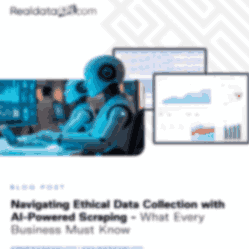


https://www.realdataapi.com/ethical-ai-data-scraping-guide-for-businesses.php
In today’s data-driven economy, information is power. Businesses across industries—from retail and travel to food delivery and finance—are leveraging web scraping to unlock valuable insights. But as Artificial Intelligence (AI) becomes more deeply intertwined with data scraping, one pressing concern looms larger than ever: ethics.
Ethical AI data scraping isn’t just about avoiding legal pitfalls; it’s about building trust, protecting privacy, and ensuring long-term sustainability. This guide will walk you through why ethical scraping matters, how to implement it, and what best practices can help you stay ahead of the curve.
With AI technologies accelerating the speed and scale of data extraction, businesses can now gather massive volumes of information in real-time. But that power comes with responsibility. Ethical AI scraping ensures that your data collection methods do not violate user rights, terms of service, or intellectual property laws.
From consumer protection regulations like GDPR and CCPA to internal compliance and brand reputation, ethical scraping is no longer optional—it’s a must.
Let’s break down what makes a scraping operation “ethical” in an AI-powered world:
Always clarify why you’re collecting the data. Whether it’s for price tracking, product analysis, or market trends, being transparent—especially with internal stakeholders—helps maintain accountability and ensures alignment with business goals.
Websites often outline their scraping rules in robots.txt files and user terms. Ignoring these guidelines not only exposes your business to legal risk but also damages relationships with data sources. Responsible scraping tools should automatically detect and respect these directives.
High-frequency requests can burden website infrastructure. Ethical scrapers must use intelligent throttling and respect request intervals to prevent disruption. AI can help here by mimicking human browsing behavior to reduce the footprint.
Personally Identifiable Information (PII) should never be scraped or stored without explicit permission. AI-powered scrapers must be trained to ignore such fields unless it’s part of a legitimate, opt-in use case.
Ethical AI scraping focuses on relevance and quality—not just volume. Smarter algorithms help extract clean, accurate, and structured datasets that actually drive insights, rather than cluttering up dashboards.
You might ask—how can AI, often blamed for creating ethical grey areas, help solve the same problem? The answer lies in automation with safeguards.
AI models can be trained to:
Recognize and avoid scraping sensitive content
Adapt scraping speed based on server load
Detect changes in website structure to avoid extraction errors
Tag and flag potentially non-compliant content
By combining AI with ethical design principles, businesses can turn web scraping into a sustainable, scalable practice.
Here are a few examples of how businesses can ethically scrape data with AI:
E-commerce: Monitoring competitor pricing on public product pages to inform your pricing strategy
Travel: Analyzing publicly listed hotel rates for dynamic fare comparison
Food Delivery: Tracking menu prices across regions from QSR apps without accessing user data
Retail: Extracting product availability or discount data from brand websites
Healthcare: Collecting public hospital data (not patient data) to analyze service reach or timings
Each of these use cases provides value without breaching ethical lines.
To ensure your AI scraping remains ethical and compliant, here are some actionable tips:
Use Proxies Responsibly: Rotating IPs should never be used to bypass explicit anti-bot protections.
Invest in Logging & Auditing: Maintain logs to track scraping activity. This can help resolve disputes or refine scraping logic.
Deploy CAPTCHA-Aware Tools: Ethical scrapers should pause or stop when CAPTCHA is triggered—don’t attempt to brute-force access.
Regularly Review Legal Guidelines: Stay updated on data laws in all target markets, especially if you operate internationally.
Web scraping powered by AI can give businesses a competitive edge—but only when executed responsibly. At its core, ethical scraping isn’t a limitation—it’s a strategy. It protects your brand, fosters trust, and lays the groundwork for long-term innovation.
By aligning your scraping practices with legal norms and ethical standards, you not only avoid risks—you unlock higher quality insights with confidence.
